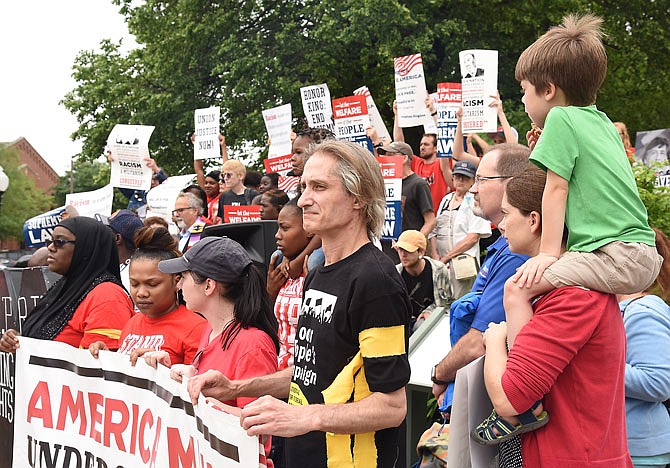Calls for racial and economic equality echoed throughout downtown Jefferson City for the second straight Monday as protesters from around the state gathered at the Missouri State Capitol.
Members of Missouri's Poor People's Campaign and groups in about 40 other states participated the nationwide protests Monday. Some called for an end to systemic forms of racism that persist, while others called for reforms to a broken immigration system.
About 100 demonstrators marched from First United Methodist Church on Monroe Street through downtown on High Street and to the south side of the Capitol. The group plans to hold weekly protests through June 18 in marches reminiscent of Martin Luther King Jr.'s Poor People's Campaign.
The Rev. Rodney Williams, of Kansas City, said past movements made changes that desegregated schools and prohibited discriminatory housing practices on the basis of race. Missouri Senate Bill 43, which made it harder to sue businesses for discriminatory practices, and the state's new voter identification law hearken back to Jim Crow-era laws, Williams told the crowd.
"We have seen our legislators and legislators across America pass laws that attack discrimination laws, pass laws that attack our voting rights," Williams said.
Williams told the News Tribune economic inequality is a chief concern of the group. Speakers at the event called for the state to raise its minimum wage. Over the 2018 legislative session, however, efforts to raise the state's minimum wage sputtered in the Missouri General Assembly.
"They are interwoven together," Williams said. "The people who are experiencing racism are also people that are experiencing economic degradation."
Other protesters called for changes to what they described as a broken immigration system that unfairly profiles undocumented residents.
In 2012 Gaby Carmona gained protection under the federal Deferred Action for Childhood Arrivals program. At age 4, Carmona's parents brought her to the United States from Mexico in 1990. Today, she works in Kansas City as a client advocate for a domestic violence shelter.
For more than 25 years, Carmona has called the United States home. She's seeking to gain legal status but said she feels caught in a confusing and broken web of immigration laws.
The DACA program was supposed to end in March, but a series of court rulings has extended the life of the program. In May, Texas and six other states sued to end the program. Since then, other states have sued to keep the program alive.
Carmona's mother has since gained residency status. Her father and husband remain undocumented, though. To gain legal status, Carmona said, she needs an immediate family member to sponsor her, but her 15-year-old son must wait until he turns 21 years old to sponsor her.
Carmona said she fears the hard-line stance on immigration taken by the administration of President Donald Trump.
"To love a country and be deeply connected to a country only to be rejected is a terrible thing," she told the crowd.
As the regular legislative session wrapped up last week, the Missouri Legislature cut the corporate tax rate from 6.5 percent to 4 percent. Lawmakers also lowered the individual income tax rate from 5.9 percent to 5.5 percent for most residents. Proponents hope the tax cuts will help attract businesses to the state and create jobs.
Missouri NAACP President Rod Chapel Jr. said the state can barely fund education, Medicare and other programs. Taking money away from those programs will cost Missouri residents more in the long run, he said.
"Any business that is attracted by something that feeble is not here to stay," Chapel said. "It's here to use resources and leave."
The Jefferson City Police Department cited a dozen people during Monday's demonstration as they blocked the entrance to the media parking lot on the Capitol's south side. Last week, Jefferson City police cited 88 people following a similar demonstration.

